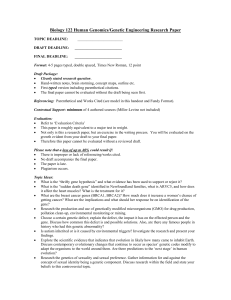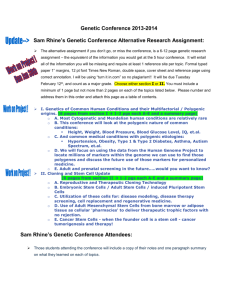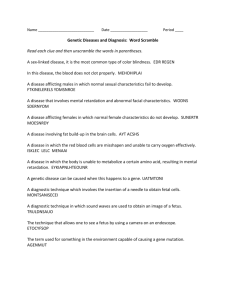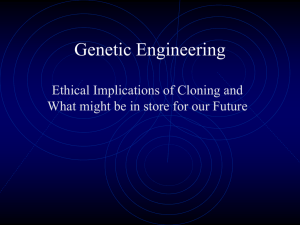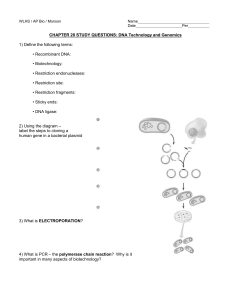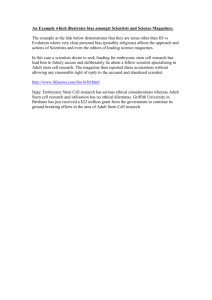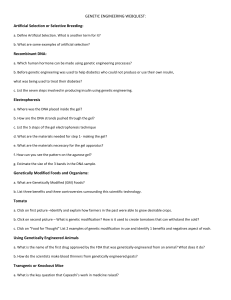Unit 9: Issues in Biology
advertisement
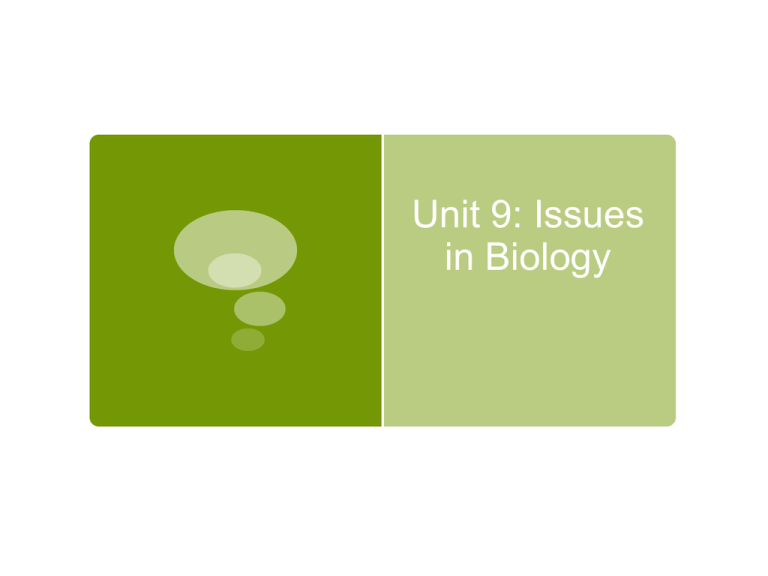
Unit 9: Issues in Biology Essential Questions What are some current ethical issues in biology? How do these issues effect me? My classmates? The world? How can I formulate an opinion on these issues based on factual evidence? Why is it difficult to formulate an opinion on these issues? Day 1: Genetic Engineering Learning Objectives: To define genetic engineering and give examples of genetic engineering To think of reasons why genetic engineering might be useful To form an opinion on different situations whether they are right or wrong To decide whether particular situations should be allowed to continue To accept other people’s opinions, regardless of whether you agree or disagree with them Starter What is genetic engineering? With your group come up with some specific examples of things that have been genetically engineered. Discuss whether you think these examples are right or wrong and why you think this. Time: 10 minutes Activity 1 Work with your lab group There are 5 different cases of genetic engineering on the back lab benches For each of the cases write down what you think of the following: Why might this be useful? Do you think it is right or wrong? Why should it continue/stop? If your group has conflicting views, write down all your thoughts and opinions Time: 50 minutes Activity 2 Discussion of issues Issues: Dolly the sheep Genetically modifying crops so they grow bigger Genetically modifying organs in pigs so they can be transplanted into humans Cloning endangered/extinct species Genetically modifying salmon so they are bigger Time: 20 minutes Day 2: Gene Therapy & Offspring Selection To learn about cystic fibrosis, an inherited genetic disorder To learn about gene therapy To make decisions regarding genetic testing and gene therapy Starter If you could choose what traits your children would inherit, would you? What traits would you want your children to have? What do you think about this idea of being able to select the genes that your children would inherit? Time: 15 minutes Video Clip: Gattaca Activity 1 You will be put into groups Read through the “cystic fibrosis and gene therapy” article What is cystic fibrosis and how does cystic fibrosis affect the individual? What is gene therapy? If you found out you were going to have a child with a genetic disorder, what would you do? Time: 25 minutes Activity 2 Read and discuss the case study “Sometimes it is all in the genes” with your group Answer your questions on a separate page Time: 30 minutes in group, 15 minutes class discussion Day 3: Human Overpopulation Learning Objectives: To learn that human population is growing at an exponential rate To understand the problems that the overpopulation of humans can cause on the Earth Starter Watch the video clip and answer the following questions: To what extent do you think that rates of longevity and advances in medicine and food production impact the growth of the world's population? Why do you think that population growth might be a source of concern? What potential environmental, economic and social problems are associated with overpopulation? Time: 15 minutes Video: Earth Overpopulation Awareness Activity 1 You and your partner will be given a country Research the population and demographics of your assigned country and the current status of the country's natural resources. These resources might include fresh water, forests, clean air, wetlands and oceans. Identify how the country's people benefit from the natural resources and the extent to which the resources are being threatened by human consumption. You will present your findings at the end of 30 minutes Time: 30 minutes Activity 2 Present your findings to the class Countries included: China, India, USA, UK, Indonesia, Russia, Brazil, Pakistan, Japan, Nigeria, Germany, Egypt, Vietnam, South Africa Time: 15 minutes Video: The Science of Overpopulation Activity 3 Answer the following questions with your group: 1. What correlations, if any, can be drawn between overpopulation and poverty? 2. What do you think might happen to our planet and its inhabitants if the Earth's natural resources were completely used up? 3. In your opinion, will the world's natural resources be able to handle the Earth's growing population? Why or why not? If not, what can be done to address this problem? 4. What do you think the world will look like in 50 years? In what ways might the world your children and grandchildren live in resemble anything you have known? 5. In your view, what challenges are associated with stabilizing the world's population? Hand in when completed Day 4: Stem Cells (60 min) Learning Objectives: To understand what embryonic stem cells are To research the studies currently being done on embryonic stem cells To debate whether research into stem cells is right or wrong Starter What are stem cells? Why are they so controversial? Time: 10 minutes Video Clip: Creating Embryonic Stem Cell Lines Activity 1 You will be given either a number 1 or number 2 You will work with this group to defend your side of embryonic stem cell research and therapies 1 – For research into stem cells 2 – Against research into stem cells You will get an opening statement, rebuttal, and closing statement Time: 30 minutes Activity 2 Debate Day 5: Exam preparation
